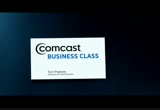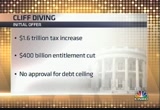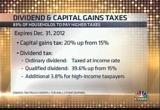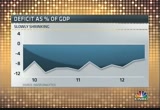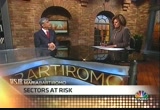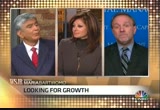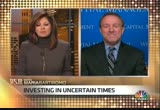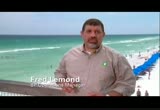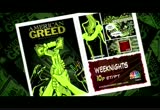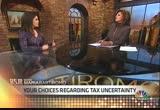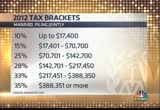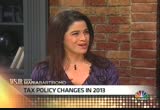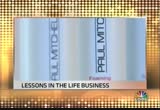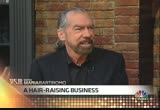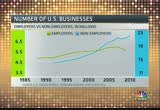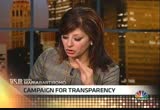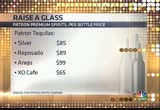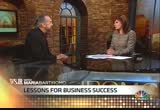tv Wall Street Journal Rpt. CNBC December 2, 2012 7:30pm-8:00pm EST
7:30 pm
hi, everybody. welcome to the "wall street journal report." i'm maria bartiromo. fiscal cliff or fiscal mole hill? worse than we thought or nothing to worry about? two strategists with different opinions. and why what happens in washington may not matter that much. and decisions, decisions at year-end tax time. we'll have important advice. and he went from living on the street to living in the lap of luxury. john paul dejoria's remarkable ride. you went from homeless to a billionaire. the "wall street journal report" begins right now.
7:31 pm
>> here's a look at what is making news as we head to a new week on wall street. in washington, posturing politics and high-stakes poker with america's economy at stake. president obama's initial offer on the fiscal cliff was resoundingly rejected by republicans. it included a $1.6 trillion tax increase, double what he campaigned on. also included $400 billion in entitlement cuts eliminating the need for congressional approval to a raise the debt ceiling. the markets rebounded later in the week following the latest hopes on a fiscal cliff agreement. america's economy grew at a faster pace than initially expected in the third quarter of the year. the second reading of the gross domestic product showed it at rate of 2.7% spurred by stronger inventories and exports. the securities and exchange commission is looking for a new chairman.
7:32 pm
mary shapirp schapiro announcin she will step down after nearly four years on the job. the obama administration says it will announce a replacement in the near future. starbucks has a new way to spend a lot of money. it is introducing the most expensive blend made from a rare costa rican variety named geisha. it is $7 a cup and only available in 48 stores. if you order one, drink it slowly and enjoy every sip. is the fiscal cliff a mountain or mole hill? it depends who you ask and my next guests have two different opinions. joining me is komal sri-kumar, chief strategist with tcw and jim paulsen at wells capital management. good to see you. thank you for joining us. >> thank you. >> sri, your thoughts on the fiscal cliff. you say even if washington comes to a compromise we will see a drag on the economy and markets. why? >> i think we are going up the fiscal mountain now. it doesn't have to be a fiscal
7:33 pm
canyon. you don't have to have a lack of agreement and falling off the cliff in order for you to have a negative impact on the economy. even if you are coming down a fiscal slope with increase in some of the tax rates, for instance, expiring the payroll tax cuts to expire or minimize taxes to hit some people. high tax residents new york, california may find some of the deductibility of taxes is restricted. all of that is going to have a negative impact on consumption. we have seen the third quarter show that consumption increase is slower than expected. that's going to get accentuated as we go into the new year, which is why i think even if there is an agreement the impact is going to be quite negative. >> jim, you disagree. you call it a mole hill. what do you mean? >> i think it's sold as a cliff as if we're going to fall entirely off and have this massive fiscal tightening next year. what is more likely is a modest
7:34 pm
tax hike and spending cuts and most things extended and we live to fight for another day. i personally think we will have fiscal cliffs over and over the next several years. if you have a modest fiscal tightening next year, it's nothing new for the economy. we have had 1% for every year of the recovery. the deficit has improved by about 3.5% in the first 3 1/2 years of the recovery. so a little more modest fiscal tightening hasn't stopped the recovery and probably won't next year. i agree it is a negative but you have to weigh it in the drop in unemployment, the revival in china, the four-year high in confidence, the rise in home prices and housing activity. a lot of other positives will help keep consumers, businesses and other things strong even in the face of modest tightening. >> which sectors are at risk? even if there is an agreement. you say there are certain sectors at risk even with an
7:35 pm
agreement. >> the areas at risk are more the risk-on strategies, the aggressive strategies. for instance technology could come under pressure. some of the areas which have been hit more recently such as high dividend stocks, dividend utilities are likely to benefit. i don't think the taxes will increase much on them after all. you have some areas which will get affected. i would say don't be aggressive. don't look for economic growth to pick up. be on the defensive side and you will be amply toward it. >> which is why people are sitting on their money right now. you are saying the fed is still there. you have the aftereffects of superstorm sandy, accommodative policy by the fed and you think that spurs growth in the u.s. how strong will it be? >> first thing, we have grown 2.5% in the last four quarters. and i think we will go up to 3% growth next year. i think there is some fiscal tightening but that is nothing new. we are getting rapid money
7:36 pm
growth and record-low mortgage rates, drop in gas prices, drop in the dollar, lower inflation boosting income and it's working because we are getting more parts of the economy gearing. a year ago we had no bank lending and now we have a full year of it. in addition to that, i think next year's profile will be much more impacted by what happens in the emerging world if they pick up again than what is going on in washington. >> i would differ significantly in terms of where we are headed and the recommendation for investors. first, this is the slowest recovery we have had with the sharpness of the recession we had in 2008, 2009. very different from the early 1980s. second, germany, including the rest of the european union seems to be going into a recession and germany entering it means 2013, first half, is going to be very difficult. chinese growth slowed
7:37 pm
significantly. i can't see where the u.s. growth will come from. exports will suffer. >> jim, we are seeing a lot of activity at the end of the year as investors and companies try to beat those higher tax rates. for example, some companies issuing special dividends because they assume tax rates will go up next year, which will they will, but you don't think it is good for toward the special dividends we are seeing. >> i'm okay if it is a dividend-paying company, like utility companies or high-yield staple stock or something. if they're going to pay a special head -- because that's why shareholders buy their company. i'm not okay with it in areas where i make an investment for companies for growth and they come up and pay me a special dividend this year. it makes me weary. if the best i can get is they will pay their cash to pay a dividend i question if they have any growth opportunities. >> what do you want to do with your money in light of all of this?
7:38 pm
>> i want to shop the euro. i believe the dollar will be strong. gold price will not go up. if you're looking for deflationly influences, gold prices will go down. fixed year income with a treasury in the 160, i look for it to go below 150 and take some profit from that. and all of those will be the places to be in rather than stay in cash. >> jim, what to you think? sri is shorting the euro. what do you want to do in terms of allocating capital? >> i couldn't be different. we are finishing the fourth year of positive returns in the stock market. that backdrop has been the one that is laid out every year, too much risk, stay away, stay conservative and the market has gone up every year. i think we will have the fifth year of double-digit returns in 2013 and the fiscal cliff will come and go and be driven by revitalization and global growth and rise pg confidence.
7:39 pm
i would overweight emerge markets and the moving sector of industry materials and the financials in this country. i think it is a risk on year. not a risk off. >> we will leave it there. they say that's what makes a market. we will be watching the developments in 2013. my thanks to komal sri-kumar and jim paulsen. what the fiscal cliffhanger means for your wallet and your taxes. and later, the entrepreneur who went from living in the back of the car to running a major beauty company. paul mitchell founder john paul dejoria will join me. look at how the stock market for the week ended. back in a moment. [ male announcer ] citi turns 200 this year. in that time there've been some good days. and some difficult ones.
7:40 pm
but, through it all, we've persevered, supporting some of the biggest ideas in modern history. so why should our anniversary matter to you? because for 200 years, we've been helping ideas move from ambition to achievement. and the next great idea could be yours. ♪ all of a sudden, when you have been making them with somebody else for 35 years. i guess there is something in me that has always been strong. i've always gotten through some pretty rough stuff without falling to pieces. ♪ ♪
7:41 pm
bp has paid over twenty-threebp billion dollarsnt to the gulf. to help those affected and to cover cleanup costs. today, the beaches and gulf are open, and many areas are reporting their best tourism seasons in years. and bp's also committed to america. we support nearly 250,000 jobs and invest more here than anywhere else. we're working to fuel america for generations to come. our commitment has never been stronger.
7:42 pm
welcome back. if all the talk about the looming fiscal cliff has you wondering what it means to you. we have advice on how potential changes to tax policy could impact your wallet and your investments in luckily 2013. donna rosato is "money" magazine's senior writer and good to have you back on the program. >> thank you. >> how does the fiscal cliff impact our personal decisions about what investments we make, what to buy or sell before the new year? >> there's a lot of worry about what it will mean for the individual investor. you need to think big term or long term. your long-term investment strategy shouldn't be dictated by tax policy. as warren buffett said in a recent editorial in the "new york times" he's met a smart investor who has seen a good investment opportunity who said i'm not sure i will do it because i'm worried about what the taxes will be. >> there are things that will happen over the near term that
7:43 pm
could impact. >> there are things you can do to put yourself in a better position. i would recommend that if you are thinking of taking capital gains, if you have appreciated investments this is a good time to take a capital gains -- capital gains rate is much lower. max out your tax advantages, 401(k), 529, and you will shelter income and lower income from whatever higher taxes will be. i think a terrific thing to do is to convert to a roth. it has been a good strategy for people but you are taxed on the conversion. that stopped a lot of people from doing it. if you do it now the tax will be based on 2012 lower rates. more importantly the assets in your roth, if you think that tax rates will go up down the road and i think most people do, you can withdrawal them tax free when you are retired. >> what about the expiration of the bush-era tax cuts on those
7:44 pm
who make more than $250,000 as far as a couple or as a single person. any taxes away from capital gains we should be concerned about? >> we've been talking a lot about how it will affect your investments. it will affect people across the board. you will see higher income tax rates and that's going to have an impact on lower earning households, about $400 a year they may pay more in taxes. middle income families could be $2,000 a year. if you are talking high income people, up to the 1%, you will see tens of thousands of dollars in higher tax rates. it's not just that, though. the expiration of the payroll tax holiday, that will increase $10,000 and a lot of tax credits will disappear if nothing is done. >> you want to have as much action as you can in 2012 when the rates are lower. >> ask you about the tax ret credits expiring. fairly commonly used actually. tell us about those and what to expect. >> you can forget your taxes
7:45 pm
going up. there are a lot of credits and deductions that will go away too. the child tax credit. that's at $1,000 -- $1,000 credit. that would be cut back to $500. the american opportunity tax credit which allows you to take a kretd credit of up to $2,500 of college expenses would disappedi disappear altogether. the things congress has put in place to reduce marriage tax penalty would be gone. the amt would be gone. those are things that would disappear that people may not be talking about as much right now. >> they are all talking about mortgage deduction and charitable deduction. these are also on the table. possibly on the chopping block. >> those things are, as well. another thing people haven't been thinking about as much but estate tax, dramatic change in that. that has been all over the board for a number of years. but it is on the table now. right now, estates up to $5 million are exempt from the tax which is 35%.
7:46 pm
that would drop to a $1 million threshold and the tax rate from 35% to 55%. so that's an area you want to think of gifting more, doing things to reduce your taxable, for your heirs, the taxable part of your estate. >> interesting. a lot of things to do this year in particular. great to have you on the program >> thanks, maria. >> wonderful insights as always. donna rosato. up next, why the entrepreneur who went from homeless to having billions says he'd do it all again in today's economy. >> we believe what we did would work. no matter how bad times were. if we want to improve our schools... ... what should we invest in? maybe new buildings? what about updated equipment? they can help, but recent research shows... ... nothing transforms schools like investing in advanced teacher education. let's build a strong foundation. let's invest in our teachers so they can inspire our students.
7:49 pm
welcome back. you may know his face and hair from the paul mitchell hair care commercials, but you may not know his business. john paul dejoria is the co-founder of paul mitchell hair care. and patron spirits. great to have you on the program. >> pleasure. >> thank you for joining us. you went homeless to a billionaire. >> yes. >> thanks to the multibillion dollar hair care paul mitchell systems. how did you do it? >> we did it in the worst economic times. worse than today. in 1980, interest rate was 22%, unemployment, 10.5%. we waited in line for gasoline. however, we felt we had such a great product with such quality that even though we started with $700 and stayed in my car because the backer pulled out
7:50 pm
that if we told enough people about it and believed in what we did, one day someone will start to reorder. very difficult for the first two years. should have gone bankrupt every week but we believed what we had was good and we were prepared for a lot of rejection, knowing we may have to knock on ten doors and maybe up to 100. >> that is extraordinary. homeless to billionaire. you said the product was in your car. what was the biggest thing that moved the needle for you? that got your business moving and put you in a different place? >> the big mover was we believed what we did would work. no matter how bad times were. and then at one point after two years we finally paid our bills on time, which was a miracle. i had a couple thousand in the bank and now we knew we could take off and do extremely well. but the mover all along was we believed our product was so good, hairdressers, the
7:51 pm
professionals would use it and love it so much, they would use it and recommend it to their customers. we saw our dollars go up to $1,000 a month, 1,5$1,500 a mon. we knew we were going in the right direction. no matter how little we were we kept growing and believed we were great. >> extraordinary. what do you think in terms of the future a lot of people look at small business as the engine of the economy. >> it is the engine. and people today -- and our economy was even worse in those days -- can really move ahead and do the same thing. but the thing stopping people now is that thing called belief. all due respect to our elected officials, there was a fellow named la guardia, who during world war ii entered new york city as the mayor. one of the top three mayors in the united states of america, he went in when there was business problems. there were deficits, unemployment, just like it was today, horrible. but he made a statement that changed everything. it was this. i'm going to keep my promises
7:52 pm
and if i don't keep my promises, get me the hell out of there. we want to see more politician do this. make all these promises and don't follow through. if they did that, i have a thing called accountabilitycampaign.com where you say what your promises are. and add a small paragraph, i will do it my first year, start it my first year and tell you why i couldn't or resign. >> so you can with the accountability campaign you want to encourage transparency. >> full transparency and accountability. if my ceos or i myself didn't do what i promised or delivered i shouldn't have my job. get me out of there. la guardia did that. he reacted and had results within six months his results started. fabulous and by gosh the guy did what he said. >> what message do you think the president is not getting from the business community? >> you are not keeping your promises. that's why we are so upset. when he started out, he said, no
7:53 pm
lobbyists, i will erase all pork barrel spending. you never did it. a lot of confidence lost. like you never ran a lemonade stand. you are a good man and probably mean well but we need more accountability, sir. >> you also co-founded patron spirits which ushered in the market for premium spirits. how is that business today and is there still growth there? >> yeah, patron last year became the number one by dollar tequila company in the world. during tough times people want to drink. they know patron is different. they are treating themselves, spending $50 on a bottle and drinking more responsible and tasting the extra quality. >> do people drink alcohol more during tough economic times? >> it is not that think drink it more and i say that because for the first years the spirits business was off a little bit. i think they are choosier in what they drink. they want extra good quality to treat ourselves or have beer.
7:54 pm
>> you were a door to door encyclopedia salesman in your early career. what did that teach you in terms of success and working hard? >> the greatest thing i can share with america is you are taught how to be prepared for rejection when you knock on 50 doors and they are slammed in your face and door 100 it is just as enthusiastic and you believe and eventually get through doors. >> what an inspiration. great to see you. john paul dejoria joining us. up next, we will look at the news this upcoming week that will have an impact on the money. and the course of true love never did come smoothly especially when it comes to finding the perfect holiday gift. why partridges and pear trees are subject to the whims of the economy. so if you're one of the who gets heartburn and then treats day after day... block the acid with prilosec otc and don't get heartburn in the first place!
7:57 pm
we have big news to tell you about, beginning in january, we will have a new name. look for us "on the money with maria bartiromo." we will have exciting segments and great guests and i will be here as well. join us. the stories that may impact your money. on tuesday, numbers for november auto sales will be out. and then friday we get the latest jobs report which tells us how many jobs the economy lost or gained in the last month, as well as the percentage of americans unemployed typically a market mover and the latest reading of consumer sentiment is out on friday. when it comes to finding the perfect holiday gift, what's
7:58 pm
$100,000 between true loves? the cost of christmas, the total of all 364 gifts mentioned in that song about the partridge and the pear tree was released this week by pnc's wealth management group. for $107,300, you can buy your true love everything mentioned in all the carol's repeated verses. a drought in the midwest impacted bird feed prices and swan market drove up this year's christmas index 5% over last year. good thing hope and cheer are still free. that will do it for us. thank you for joining me. my guest next week former secretary of labor robert reich. join us for that. keep it here where wall street meets main street. have a great week, everybody. i will see you next weekend. bp has paid over twenty-threebp billion dollarsnt to the gulf. to help those affected and to cover cleanup costs. today, the beaches and gulf are open,
7:59 pm
192 Views
IN COLLECTIONS
CNBC Television Archive
Television Archive  Television Archive News Search Service
Television Archive News Search Service 
Uploaded by TV Archive on

 Live Music Archive
Live Music Archive Librivox Free Audio
Librivox Free Audio Metropolitan Museum
Metropolitan Museum Cleveland Museum of Art
Cleveland Museum of Art Internet Arcade
Internet Arcade Console Living Room
Console Living Room Books to Borrow
Books to Borrow Open Library
Open Library TV News
TV News Understanding 9/11
Understanding 9/11